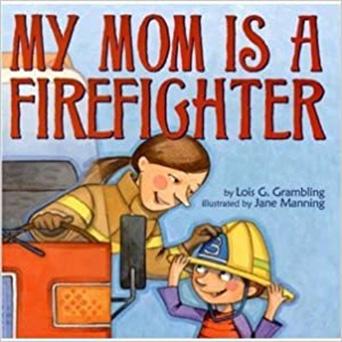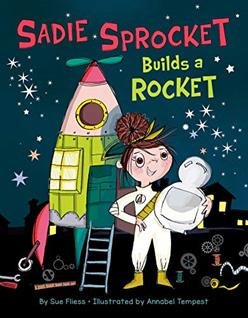
5 minute read
Challenging Gender Stereotypes
Girls Can Be Plumbers Too: Using Bibliotherapy To Challenge Gender Stereotypes in Careers
By Laurie Dickstein-Fischer, Ph.D. & Jacquelyn Saunders What do you want to be when you grow up? We have all been asked this question when we were children and continue to ask the same question to young children today. Sadly, gender biases still exist when children answer this question. As early as preschool, children formulate ideas on what roles males and females should have for career exploration. My son Matty is 5 years old and I started noticing that at age 3 he had already begun to formulate his own ideas about career based on gender. Children’s ideas can be demonstrated through their conversations with others, their make-believe play, and artistic drawings. A 2018 study in the UK found that this gendered way of thinking can be seen in students in elementary school. (Chambers, Rehill, Kashefpakdel, & Percy, 2018). A group of students were asked to draw what they wanted to be when they grew up and patterns of boys wanting to do traditionally masculine jobs and girls wanting to do traditionally feminine jobs were seen. These ideas have lasting real world effects. According to the U.S. Bureau of Labor Statistics, 80% of elementary school teachers in the US are women (U.S. Bureau of Labor Statistics, 2020). 92% of hairdressers are women. Likewise, men make up 94% of all mechanical engineers in the US and 98% of plumbers. As gender role theory postulates, parenting, peer groups, the educational system, and media alike tend to reinforce children’s belief in gender stereotypes – including children’s views of the culturally proscribed possibilities and limitations for people according to gender or sex. Gender Schema Theory (Bem,1981) theorizes that once children form a gender identity, they being to form gender schemas, that is beliefs about gender that influence behaviors, through observations of their environment and greater culture. Gender schemas are a way for children to organize information they take in and form their gender role. However, these gender schemas can be changed and challenged. This is where school counselors can play a critical role in changing these perceptions. Classroom guidance lessons are the perfect opportunity for school counselors to challenge gender career stereotypes. For example, counselors can select developmentally appropriate storybooks that challenge gender stereotypes and empower young students to explore their career interest and passions without bias. Additionally, school counselors can also counter gender stereotypes by using gender neutral language around professions. Reflect for a moment. Do you say “policeman” or “police officer”? “Firefighter” or “Fireman?” “Postal Worker?” or “Mailman”. Our language, like the media we consume, influences our career choices. Working to use more gender-neutral language, and encouraging our students to do so as well, we can help our students break ingrained gender stereotypes. Below is a list of books for a variety of grade levels that features a character that challenges gender norms. These books can be paired with a drawing activity, a discussion around gender stereotypes, or to highlight famous men and women who broke gender norms. Use these books to inspire your students to be whatever they want to be!
• Rosie Revere, Engineer by Andrea Beaty (Gr K – 2) • Ballerino Nate by Kimberly Brubraker Bradley (Preschool- Gr 2) • Mae Among The Stars by
Roda Ahmed (Preschool – Gr 3) • Max, the Stubborn Little
Wolf by Marie-Odile Judes (Preschool – Gr 3) • Princesses Can Be Pirates Too! By Christi
Zellerhoff (Gr 1 -2)
• Interstellar Cinderella by
Deborah Underwood (Preschool – Kindergarten) • Madam President by Lane
Smith (Preschool – Gr 3) • When the Bees Fly Home by Andrea Chang (Gr 2 -7) • Shark Lady: The True Story of How Eugenie Clark
Became the Ocean’s Most
Fearless Scientist by Jess
Keating (Gr 1 -3)
(continued from previous page)
• Violet the Pilot by Steve
Breen (Gr 1 -3) • Phoebe and the Digger by
Tricia Springstubb (Preschool – Gr 2) • Julian is a Mermaid by
Jessica Love (Preschool –
Gr 2) • Amazing Grace by Mary
Hoffman (Preschool – Gr 3) • Dara’s Clever Trap by
Liz Flanagan and Martina
Peluso (Gr 3 - 5) • The House That Lou Built by Mae Respicio (Gr 3 – 6) • My Daddy is an Amazing
Nurse! By Donald Jacobsen (Gr K – 2)
• My Mom is a Firefighter by Lois G. Grambling and
Jane Manning (Gr K – 2)
• Sadie Sprocket Builds a Rocket by Sue Fliess (Preschool – Gr 1) Akgun, E.& Gokce, K.B. (2019). Bibliotherapy with Preschool Children: A Case Study. Current Ap proaches to Psychiatry. https://link.gale.com/apps/doc/ A571680388/AONE?u=mlin_n_ state&sid=AONE&xid= 301e43

Bem, S. (1981). Gender Schema Theory: A Cognitive Account of Sex Typing. Psychological Re view, 88(4), pp. 354-364. Chambers, N., Rehill, J., Kashefpakdel, E., & Percy, C. (2018). Drawing the Future. Education and Employers. https://www.educationandemployers.org/wp content/uploads/2018/01/DrawingTheFuture. pdf Massachusetts Department of Elementary and Secondary Education. School and District Profiles: Lynn Vocational Technical Institute. (2020). Retrieved February 6, 2020 from https://profiles.doe. mass.edu/students/classsizebygenderpopulation.aspx?orgcode=0163 605&fycode=2021&orgtypecode=6&
U.S. Bureau of Labor Statistics. Employed persons by detailed occupation, sex, race, and Hispanic or Latino ethnicity. (2020, January 22). Retrieved November 27, 2020, fromhttps://www.bls. gov/cps/cpsaat11.htm
Laurie Dickstein-Fisher is a MASCA Board Member & Program Director for Salem State University’s School Counseling/School Adjustment Counseling Program. Jacquelyn Saunders is a MEd in School Counseling Candidate ‘21, School of Education, Salem State University
April 2021 Awareness Dates
Alcohol Awareness Month Child Abuse Prevention Month Community Service Month Counseling Awareness Month D.E.A.R. Drop Everything and Read Month Keep America Beautiful Month Mathematics Awareness Month Month of the Military Child National Autism Awareness Month National STD Awareness Month National Youth Sports Safety Month School Library Month Sexual Assault Awareness and Prevention Month 1 Sexual Assault Awareness Day of Action 2 World Autism Awareness Day 4 10 National Library Week 7 World Health Day 8 Holocaust Remembrance Day 8 National Alcohol Screening Day 10-16 Week of the Young Child 12-16 National Youth Violence Prevention Week 18-24 National Volunteer Week 22 Administrative Professionals Day 22 Earth Day 22 Take Our Daughters and Sons to Work Day 23-25 Global Youth Service Days 23 Day of Silence 30 Children’s Day/Book Day









